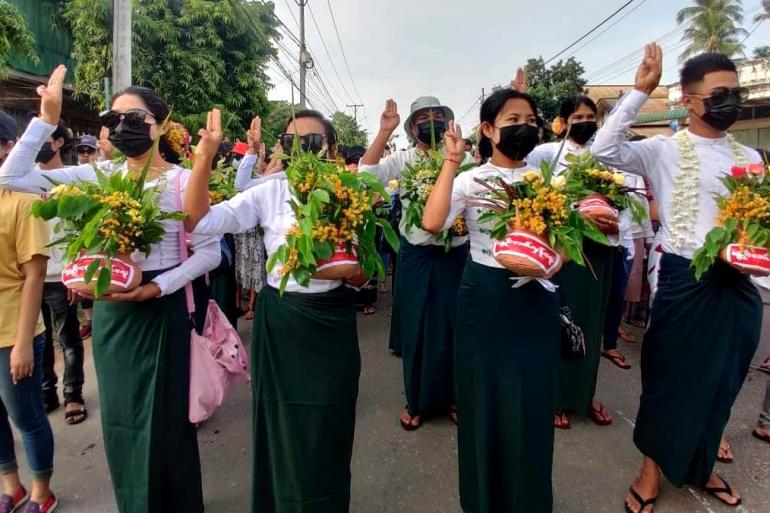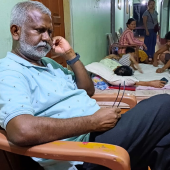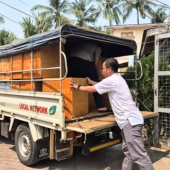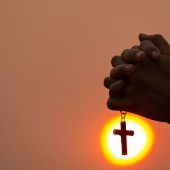Multiply loaves of compassion in Myanmar; feed people with bread of healing, peace

Cardinal Charles Maung Bo of Yangon
Week after week, our hands are raised in prayers of hope, prayers of anguish to the Lord.
The gravity of the situation struck us intensely when Bishop John Hsane Hgyi, the amiable shepherd of the Pathein diocese passed away in the early hours of July 22, Thursday. He was gone too soon.
A compassionate pastor, a kind bishop, an erudite scholar, the ever-smiling accompanier of the weak and the vulnerable fell victim to the cruel virus. Our condolences to the diocese he led with great joy and competence, to his dear family. His loss is an irreparable loss to the whole Catholic Church in Myanmar. He will be sorely missed in the CBCM meetings. May his soul rest in peace.
We grieve for thousands of others infected, living with existential anxiety.
These are apocalyptic times: starvation, struggle for oxygen, long queues in the cemeteries and the persisting virus of conflict and poverty of our people. We plead with those who rule: Be Good Shepherds, save our people.
Unless there is peace, hundreds will be buried everyday. We cannot afford conflict. Once again, I appeal, peace is the only vaccine against what is turning into an apocalypse of death and disease. God is calling us: Stop all the flow of tears from the eyes of our countrymen and women. Yes, we can turn the tide. That is God’s will and call from every heart in this country.
We are presented with the soothing words in today’s readings: In the moments of darkness, a united people knocking at the doors of God can work wonders. These are the themes for us to contemplate, to seek light through the tunnel of despair we are passing through:
Reading I: 2 Kgs 4:42-44. The Prophet Elisha Feeds the Hungry people
Reading II: Eph 4:1-6. St Paul pleads for the Unity of the people to become God’s people
Gospel: Jn 6:1-15. Jesus multiplies loaves and feed five thousand with the bread of compassion
The core theme in all the readings is “sharing” — in the first reading and in the Gospel. The second reading identifies the obstacles to that sharing: Disunity. When we contemplate the message we realize, “How fitting these readings are to describe the plight of Myanmar today! What is God’s message?”
After six months of unbearable suffering, many people are angry, angry with God for not coming to their aid. And like protagonists in the book of Job, many are asking where is God in all these? The suffering of our people reminds us of the plight of Job. The multi-layered suffering: COVID, Conflict and Collapse of the economy. Starvation, unemployment, conflict and displacement, violent deaths of hundreds and as COVID entered, lack of medicine and oxygen.
What happens in Myanmar wound sensibilities. The world cries with our people. The pope continues to pray with us with those poignant words: “I too kneel on the streets of Myanmar and say stop the violence! I too extend my arms and say, let dialogue prevail.
How do today’s readings give pointers to where is God in all these?
There are two desperate situations in the readings: the first readings talk of starvation; the Gospel talks of starvation. HUNGER of the people. These two pathetic scenes remind us of Moses and the starvation of the people in the desert, in their long journey of liberation. The Bible says God intervenes in all these: first through his prophets, but then through his own Son.
There is a similar situation in Myanmar: excruciating hunger; real hunger for food; hunger for medicine; hunger for peace based on justice. Like the Exodus people, the journey through the desert looks long; the promised land seemed to recede in the horizon. Murmurings and disunity appear, strengthening the hand of the evil.
We cry out: Lord we are hungry; hungry for the daily bread; hungry for another breadth of oxygen; hungry for medical care; hungry for peace based on justice. How long can we live with the pandemic of injustice, deprivation and desolation? Has the Lord forgotten us? No he has not. Just see our Land.
We look at our land, the Golden land. God seemed to be biased. He gave so much to the Myanmar people, above the ground and below the ground. Above the ground great wealth of forests, rivers, rich soil, a wonderful people; under the ground rich natural resources, jade, rubies, gold, oil, gas. Other countries struggling for water, etc, would look at this country and say God gave to the Myanmar people a promised land, a land flowing with all riches.
Yes, God gave five loaves to Myanmar already to feed millions, to feed generation after generation. He gave five loaves of resources: wonderful land, majestic rivers, skies that send copious rains, earth that holds priceless treasures, and more importantly a grace-filled people. Five loaves, if only equitable sharing has been done, we will not be called by the UN the least developed country. God gave everything, instead of feeding 55 million of our people, God’s gift is still eluding our people.
God did not forget my people. He gave a promise land, a land that should be flowing with “milk and honey.” But instead of milk and honey, tears and blood flow in our streets. Instead of being one of the richest countries in the world, starvation is a reality. The World Food Program has warned 3.4 million people are at risk of chronic starvation.
Jesus has not given up on us. The readings of the last three weeks point out one of the most touching qualities of Jesus. Jesus is moved by human suffering. He is Karuna; the incarnation of God’s Compassion. Mathew throws a moving scene of Jesus’ compassion :
When Jesus saw the crowds, He was moved with compassion for them, because they were harassed and helpless, like sheep without a shepherd. (Mathew 3:26)
Yes. Jesus perceives “they are harassed and helpless.” Yes, he sees our people dying without oxygen, without medicine. He sees our people waiting at the cemeteries to bury their dear ones, he sees the tears and brokenness of our displaced people. We pray that he gives us the five loaves of consolation, healing, peace, justice and prosperity.
God never remains silent. He comes at his time. We pray, let that be now. History of salvation tells us: God intervenes when silent tears of the innocent victims soak the conscience of the world. Pharaohs of history dissolved in the sink of history whilst sunk in the oppressed rewrite history; that is the story of the Exodus.
The Book of Job portrays what is the response of God when the innocent cry out to him:
They caused the cry of the poor to come before Him,
and He heard the outcry of the afflicted. (Job 34:28)
But in Myanmar we see the wicked seemed to prosper. Why do the wicked still prosper, continue on, also become very powerful?
Job has an answer.
That the triumphing of the wicked is short,
And the joy of the godless momentary? (Job 20:5)
Yes. God will act. God hears the cry of our people, will hear our cry soon. His response will start with each one of us. God helps those who help others. Yes my dear people. Let us start helping others.
In the meantime, we are asked to share. As Christians, we celebrate together, the Mass, the Eucharist, the communion, acknowledging as, St Paul says in the second reading, the letter to the Ephesians: One Body, one Lord, one faith and one baptism. The Eucharist of today is all over Myanmar: when we share our compassion, whatever we have.
We too can work out the miracle of five loaves and share with thousands.
God has given us five senses. They are like the loaves.
- Seeing
- Hearing
- Smelling
- Tasting
- Reaching out with touch
These are our five loaves.
When our senses assume the same sense of Jesus, the way he listened to the cry of the people, the same compassionate look, the same taste of people’s suffering, the same smell of the sheep he moved around and the same touch of healing, we too can break the bread.
Money is not the starting point, though it is very important. Like St Peter we can say: Gold and silver I do not have. I give what I have. In the name of Jesus. Thousands are in need and Jesus is telling every Christian today: “You give them something to eat.” Luke 9:13.
In these challenging times, we can ask how? God has already given these five loaves in each one of us. Yes, in the name of Jesus, let our five senses become the five loaves as the pandemic rages :
The bread of Sight: Let us see the suffering of our people with the eyes of Jesus, with compassion. Let not social distancing close our eyes to suffering people.
The bread of hearing: Lord Jesus heard the cries of people who were sick and healed them. Thousands cry for help, for oxygen, medicine. How can we respond.
The bread of taste: The Bible says Taste and See the Lord is good. We feel the pain of our people, we taste their sorrow and reach out to them.
The Bread of smell: Pope Francis asks that the Church should go to the sheep; come back with the smell of the sheep. Lockdowns and stays at home cannot prevent the Church and the faithful to forget the thousands. In the care centers and homes where the infected live, amidst the smell of sickness and medicines, the Lord is calling us to reach out to them.
The Bread of Reaching Out: Jesus went in search of the sick, the wounded, the lame, deaf and dumb and healed them with the touch.
In times of great pandemic, we contemplate the Compassion of Jesus which moved him to multiply five loaves to feed five thousand. He works through us today. Let us go out of our fear and insecurity to reach out. Through our prayers, through our concern for one another, let us multiply the five loaves of compassion and share with our people.
Jesus promises Us :
If anyone gives you even a cup of water because you belong to the Messiah, I tell you the truth, that person will surely be rewarded. (Mark 9: 41).
Let our five senses make us miracle-makers: God will reward us a hundred-fold. We shall join our countrymen for whom Karuna and Metta (Compassion and Mercy) are the two eyes of human existence. Let us break bread on our knees.
Radio Veritas Asia (RVA), a media platform of the Catholic Church, aims to share Christ. RVA started in 1969 as a continental Catholic radio station to serve Asian countries in their respective local language, thus earning the tag “the Voice of Asian Christianity.” Responding to the emerging context, RVA embraced media platforms to connect with the global Asian audience via its 21 language websites and various social media platforms.














